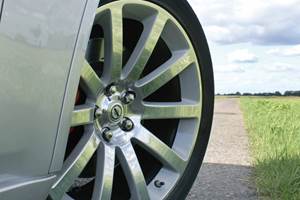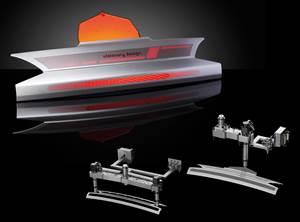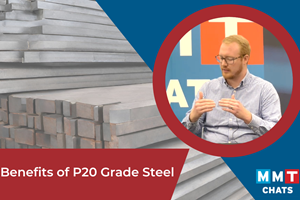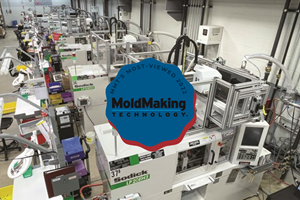Workflow and Quality Count
A recent visit to a hot runner systems and solutions provider proved the importance of workflow and quality to a production facility’s layout.
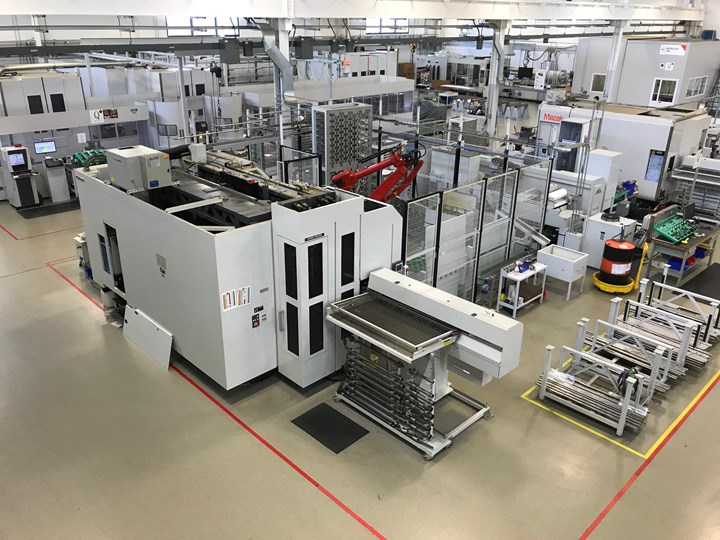
An automated DMG cell runs 48 hours straight machining hot runner nozzles (standard and specials). Image courtesy of HRSflow.
As an editor, I am often visiting shops and technology supplier facilities for stories, product launches, open houses, press events… you name it. And, it never ceases to amaze me the challenges they both have in common. I often forget that product and equipment suppliers are manufacturers too. Like the mold builders I visit, they also need to keep up with technology advancements and manufacturing strategies and apply them to the development of the technologies they sell to MMT’s audience.
I witnessed this again during a recent visit to a hot runner systems and solutions provider where workflow and quality were paramount to the facility’s layout.
The 40,000 square feet of HRSflow’s production plant in Bryon Center, Michigan, mimics the layout of the company’s Italian headquarters, which is also duplicated in HRS’ Asian production facility. The Byron Center site was built in 2015 and has the capacity for 5,000 system drops, which HRSflow could double with an expansion, if necessary, according to the company. Critical to the layout is identical global manufacturing standards that allow HRSflow to service and support products regardless of where they were originally built.
HRSflow has one product standard worldwide. They don't have a China product and a North American product. For example, they buy all their steel from one supplier, and it’s shipped to all of their plants. Also, they have the same equipment, tooling, technology, workflow, signage, and workstations in every location so they can build and support anywhere in the world.
It’s all about giving the customer what they need when they need it. “We recognize that need to produce parts in the market to truly support our customers,” Robert Harvey, Director of Sales for HRSflow North America, says.
Other plant features include:
- 58 workers in the entire Byron Center facility with 30 workers on the production floor
- Automated DMG cell runs 48 hours straight machining nozzles (standard and specials)
- 24-hour delivery of components
- A well-armed milling department dedicated to manifolds.
- An automatic CMM for system and component inspection
- Q Points signage designating areas where quality control, inspection, and measurement are taking place on the floor
- Color-coding system identifying assembly as blue and needs service as yellow
- Assembly and wiring department that has eliminated paper and relies on real-time customer data updates
- A final inspection area dedicated to verifying dimensional and mechanical connections.
- On-site spare parts warehousing with two Modula automatic vertical storage systems that provide over 9,000 square feet of storage each.
- An in-house 1,000-ton injection molding machine for demonstrations of the company’s servo-driven valve gate technology
- A drive-in, pull- through indoor shipping bay
- Additional land and facility space available to allow for expansion
HRSflow is fully committed to what it calls the “QSP1: Quality, Service and Productivity Challenge.” This project puts Industry 4.0 onto the production floor—by sharing real-time data, using business intelligence tools, applying lean thinking principles, and employing automated production—as the team manufactures its hot runner system and components.
What stood out to me most during the production floor tour (beyond its brilliant lighting, cleanliness, and order) were its strategies for production planning and quality control, which really drive home HRSflow’s commitment to being a leader in hot runner system, components and service quality.
Related Content
What Electric Vehicles Mean to Mold Builders
Harbour Results CEO Laurie Harbour on why EVs make the situation at mold and tool shops more challenging.
Read MoreHot Runner Technologies Advance Quality Surface Requirements in Automotive
Oerlikon HRSflow hot runner systems combine cost-efficient production with a precise process control for a variety of automotive applications.
Read MoreProject Reveals Added Benefits of New P20 Grade Steel in Machinability, Cycle Time and No Stress Relief
MoldMaking Technology's Christina Fuges talks with General Motors' Shane Appel about a project testing a new P20 steel grade's dimensional stability.
Read MoreMold Builder Uses Counter-Intuitive Approach for Mold Challenges
Matrix Tool Inc. answers customers’ hard questions with creative solutions for cavity spacing, tool sizing, runner layout and melt delivery that reveal the benefits of running in a smaller press size at lower cavitation but higher yield.
Read MoreRead Next
Are You a Moldmaker Considering 3D Printing? Consider the 3D Printing Workshop at NPE2024
Presentations will cover 3D printing for mold tooling, material innovation, product development, bridge production and full-scale, high-volume additive manufacturing.
Read MoreReasons to Use Fiber Lasers for Mold Cleaning
Fiber lasers offer a simplicity, speed, control and portability, minimizing mold cleaning risks.
Read MoreHow to Use Strategic Planning Tools, Data to Manage the Human Side of Business
Q&A with Marion Wells, MMT EAB member and founder of Human Asset Management.
Read More











.jpg;maxWidth=300;quality=90)




